Economía y Empresa
Management
INDEX
Introduction ······················
Organization ·····················
Globalisation ·····················
Ethic ···································
Planning ······························
Environment ························
Conclusion ··························
Bibliography ·······················
Through this work we will be able to observe two managers. They do a very similar work, with success in both cases, but with a lot of varies in the form of working in each one.
The managers that I have selected to realize this work are Alberto Martin Gonzalez and Santiago Fernandez Garcia. The first one is manager of EspaNova Networks, S.L. and Santiago is economic manager of Servicon S.A.
Espanova Networks, S.L. is a small company born in 1999 in Valladolid that is sale and maintenance computer material, and creation, maintenance and hosting web pages for companies.
Servicon S.A. is a real state company born in 1989 that tries sale and rent houses, offices and warehouses. Both are small companies, and both, at the moment, work only for the city.
Alberto Martin is a youth entrepreneur that decided to open a company dedicated to give access to the small and medium companies to the new technologies after seeing the big benefits that could be obtained in the new technology sector. Santiago Fernandez, together other partners, created Servicon, 12 years ago, and they have now a good customer share.
I have selected these managers, because I have easy access to their information and mainly because I believe that their different ways of working are very interesting to compare them in this work.
I believe that the best way to compare one with another is through asking them how they respond in different situations and that they say on certain management aspects. For this I am had with them a personal interview in their work places, and their answers were very interesting.
Next I will write and I will argue all their answers theoretically dividing them for different topics, as for example motivation, objectives, environment,...
Organisation
Managers work in places we call an organization. Therefore, before we identify who managers are and what they do, we must clarify what we mean by the term organization.
An organization is a systematic arrangement of people brought together to accomplish some specific purpose. Every organization has a purpose and is made up of people who are grouped. The distinct purpose of an organization is typically expressed in terms of goal or set of goals. Second, no purpose or goal can be achieve by itself. It take people, to make decisions to establish the purpose and to perform a variety of activities to make the goal a reality. In both cases the number of employees are reduce, 8 in Servicon and 7 in EspaNova. Third, all organizations develop a systematic structure that defines and limits the behaviour of its members.
Like we said a company need establish a goals. In the case of EspaNova (company of Alberto Martin) is still a very young company, but it has some very clear objectives. Alberto Martin wants establish his business in the local market, through obtaining a good number of fixed clients. At the end of this year he want to grow, and to work in all Castilla y Leon, for this he will create contacts with companies of other cities. With these companies he intent work through join venture. Lastly, if everything goes well, he wants that EspaNova becomes a company that works in all Spain. He want that this last step takes place in the 2003.
During the first years, its first objective, is not to make money. EspaNova wants growing, and once the company is established then they begin to think in the profits.
Servicon (company of Santiago Fernandez) is a much more mature company, and for this, it has not intentions of growing. Santiago affirmed that his more important objective is the obtaining of profits. For this Servicon establish some of his objectives of figure of sales, for products, figure of costs, personal, investments, financing, etc... Apart from that, Servicon has some secondary objectives, like ethical, environmental, social objectives, etc...
EspaNova is in its first period for this is a little bit soon to see if it has gotten its objectives. Any way, until the moment is completing successfully its first objective, to establish in Valladolid market. But, like is normal, small delays always take place.
Servicon assures that the objectives don't usually complete entirely, they usually establish its objetives above the possible thing, the reason of this is to motivate. But he said that practically all the objectives that Servicon set up has been gotten.
Managers work in organizations, but not everyone who works in an organization is a manager. We can divide organizational members into two categories: operatives and managers. Operatives are people who work directly on a job or task and have no responsibility for overseeing the work of others. In contrast, managers direct the activities of other people in the organization. Customarily classified as top, middle, or first-line, these individuals supervise both operative employees and lower-level managers. Both companies have employees managers and employees operatives, but I am comparing only two managers. I don't study any operative in this work.
There are three types of managers: First-line managers, middle managers, and top managers. First-line managers are supervisors, responsible for directing the day-to-day activities of operatives employees. Middle managers are individuals at levels of management between the first-line manager and top management. And finally top managers are individuals who are responsible for making decisions about the direction of the organization and establish policies that affect all organizational members. We can see this very clear with the following pyramid.
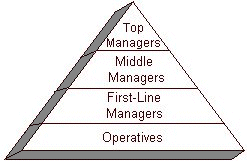
In our case, both are managers, but Alberto is Top Manager, because he is the higher position of the company, and Santiago is Middle Manager, because he is between the General Manager of the company and operatives, like we are going to see after, with organizational chart.
Organization members must develop an effective structure that will best facilitate the attainment of those goals. When managers develop or change the organization's structure, we say they are engaging in organization design. This process involves making decision about how specialized jobs should be allocated, the rules to guide employees' behaviours, and at what level decisions are to be made. The reason of this is because each of us works in some type of organization structure, and we need to know why we are “grouped” as we are. In addition, given the changing environment and the need for organizations to rapidly adapt, we should begin our understanding of what “tomorrow's” structure may look like.
Work specialization has been around for centuries in industrialized countries. In work specialization, a job is broken down into a number of steps and each step is completed by a separate individual. Work specialization makes efficient use of the diversity of skills that workers hold. In most organizations, some tasks require highly develop skills; others can be performed by the those who have lower skill levels. For example in the case of EspaNova, the commercial need some types of skills very different that techniques. Skilled workers are paid more than unskilled workers. The same idea is reflect in both companies, the operatives have less skills that the managers and in consequence a smaller salary.
Work specialization creates specialists who need coordination. This coordination is facilitated by putting specialist together in departments under the direction of a manager.
One of the most popular ways to group activities is by functions performed (functional departmentalisation). It can be used in all types of organizations. Other methods are the product departmentalisation, customer departmentalisation or geographic departmentalisation.
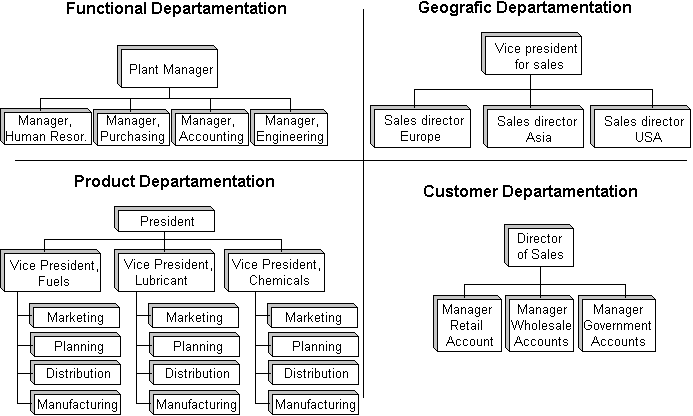
Authority refers to right inherent in a managerial position to give orders and expect the orders to be obeyed. The early managers writers distinguished between two forms of authority: line authority and staff authority. Line authority entitles a manager to direct the work of an employee. It is the employer- employee authority relationship that extend from the top of the organization to the lowest echelon, according to the chain of command. As a link in the chain of command, a manager with line authority has the right to direct the work of employees and to make certain decisions without consulting anyone. Of course, in the chain of command, every manager is also subject to the direction of his or her superior.
As organization get larger and more complex, line manager find that they do not have the time, expertise, or resources to get their jobs done effectively. In response, they create staff authority functions to support advise, and generally reduce some of the informational burdens they have.
The area in which the authority applies is define by the horizontal dimension. Each horizontal grouping represent a functional area. The influence one holds in the organization is define by the vertical dimension in the structure. The higher one is in the organization, the greater one's authority. This is represent in this chart.
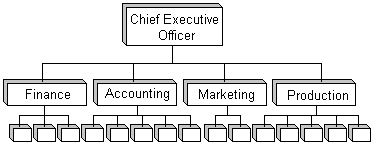
There are two types of organization: mechanistic or organic. The mechanistic organization (bureaucracy) a structure that is high in specialization, formalization and centralization. In the other hand, the organic organization (adhocracy), a structure that is low in specialization, formalization and centralization. In both companies there are a organic organization, but maybe in Servicon is a little bit more bureaucratic.
This graphic are the organisation chart of Servicon:
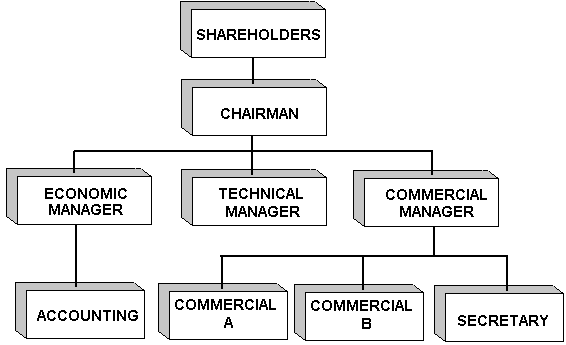
Like we can see Servicon is based in a General Manager (Chairman) and under he there are three departments: economic, Technical and commercial. Santiago Fernandez is the Economic Manager. The shareholders are in the top because, Servicon y a Ltd (S.A).
Each manager is responsible for getting the objectives that noticed for the General Manager. They are responsible also of the day to day, they usually work in permanent contact with the General Manager, obtaining their feedback, approval, etc... they are also responsible for the personnel of their department.
Each department manager has autonomy on the same one. In the case of the General Manager, he acts actively in the performances of other departments, because all the decisions that take place in the company have economic content, and this should be supervised by him.
This is the organizational chart of EspaNova S.L.
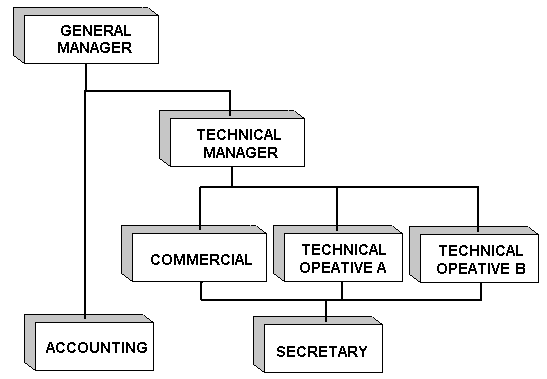
In this organizational chart we can see that is a little bit different to the graphic of the other case.
In this case there is not power of the shareholder, the reason is that EspaNova is a Public limited company (in Spain S.L). Hear the power is in only two persons, the General Manager and the Technical Manager. Alberto Martin is the General Manager. He have authority in all the position of the company, but he delegate to much duties. Under he there are the Technical Manager, this manager is in charge of realize the company's projects. Under the Technical Manager there are two technical, in charge of install the computers or realize the web page, and a commercial, he must found customers for the company. Finally the secretary is in charge of receive the customer and sell the company's products in the store.
Globalisation
The growth of capitalism makes the world a smaller place for do business. Now is normal that a small company in Spain export their product to Japan and too that this company gets their raw materials for Chile. This is possible for the globalisation. Now the new technology allow us have conversation with other part of the world easier and cheaper that some years ago. And the transport is much better too.
But globalisation introduces too new challenges for managers. One specific challenge is managing in different national culture. These include the views a manager has of people from foreign land and an understanding of their cultures. The specific challenge is recognizing the differences that might exist and finding ways to make interactions effective. One of the first issues to deal with, then, is the perception of foreigners.
All countries have different values, morals, customs, political and economic systems, and laws. Organizational forms and goals need to be understood within their social context. For example, status is perceived differently in different countries. Managers need to understand societal issues that affect operations in another countries. But no of the two companies have this problem, because his market is only Valladolid, and they don't have foreign workers.
For Santiago, the globalisation it is however something that affects us to all, in their sector (real state) has much less importance than in other, like for example in a factory of cars.
Servicon has a web page for 2 years ago and although in principle they had never thought it, they have sold and rented several buildings through Internet. In most of the cases, the interested ones have been people that for work or studies reasons had to come to live to our city, and the easiest way that they have to be informed on houses in Valladolid from their cities, Internet.
In the case of EspaNova the globalisation is something much more important, because several of the services that offers (creation of web pages, holding....) can offer it around the world to customers, through Internet. And to choose the suppliers it is also very important, because they can choose their distributor of computer material with many more facilities than some years ago, now they are buying to Madrid, Valencia and Barcelona, and was unthinkable thing some years ago that you make an order to those cities, and in the same day they have already given it to you. The globalisation is allowing to EspaNova an easier expansion.
Ethic
Ethic is a code of modal principles and values that govern the behaviour of a person or group in respect to what is right or wrong.
There are four type of ethic:
-
Fairness and honesty: you can't do thing against law
-
Organizational relationship: Always must be more important the persons that the objective.
-
Conflict of interest: You can't take advantage of your position.
-
Communication: You can't lie in the publicity.
But there are some factors that influence in this perception, some thing are good in some places or some situations, and in other places or situation are bad.
-
Societal Factors: Depends of the culture sometimes some thing are ethic in some countries and in others no.
-
Legal Factors: The rules are different in some places (restaurant, weeding,…)
-
Organisational Factors: Depends of the company
-
Individual Factors: Each person have a different ethic
And finally there are three types of Manager Ethical Approaches:
-
Utilitarian approach: End justifies the means
-
Moral right approach: Must be protected the right of the persons
-
Justice: Fair distribution of benefits and burdens.
I asked them this question: if to achieve some benefit you have to do something ethical, you would do it?, both responded practically the same.
Alberto said that it would depend on the situation. There are many occasions in those that you cannot be ethical. If to get a great benefit it is necessary to be not very ethical, he said that he wasn't ethics.
On the other hand Santiago, although he said the same thing, he was a little more reserved. He comments that we all want to be ethical and to act in a legal way, but that is not always possible. And he adds that the end not always justifies the means.
Planning
Planning is the organization's objectives or goals, establishing an overall strategy for achieving those goals, and developing a comprehensive hierarchy of plans to integrate and coordinate activities. It is concerned, then, with ends as well as with means.
Planning can be further defined in term of whether it is informal or formal. Informal planning, very little, if anything, is written down. What is to be accomplished is in the head of one or few people. Furthermore, the organization's objectives are rarely verbalized. This is very common in small business, but informal planning exists in some large organizations, and some small business have very sophisticated formal plans.
In the other hand, formal planning is when the manager establish specific objectives that cover a period of year are formulated. These objectives are written down and made available to organization members.
These managers also have differences when they plan. To Alberto although he likes to write the plans, he says that he usually has all the plans in his head, and that only he writes them when they are very important, and other workers of the company or other people participate, in them
He says that it is a waste of time in small plans, of little importance, write them is a form of losing necessary time to work in other tasks.
In the other hand, Santiago prefers writing all the plans. He says that almost all the plans should be carried out in writing and making the other workers participate.
He believes that whenever it is possible, scenarios should be created, with figures, possible results. This way to see if the plans are possible or not, and to be able to modify them when there is time.
The purpose of planning is reduce the risk of a business, preparing for the changes of the environment. The manager with planning is establishing goals. Other quality of planning is that the manager can reduce waste and standardise, comparing the results with the goals of the company.
The factors in planning are:
-
Level of organization.
-
Live cycle of organization.
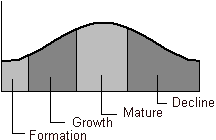
-
Degree of environment uncertainly.
-
Length of future commitments.
When they plan they have think in all the factors that can influence in the result, like they are the life of the product, the stability of the environment, the commitments that have with other people or companies. They also study microeconomic factors and macroeconomics, exogenous and endogenous factors. Both believe that all the factors are important so that the result of the plans is satisfactory, and that you cannot forget none. They also think that in all the tasks of the life, although it is unconsciously, we have in mind all these factors.
Plans that apply to the entire organization, that establish the organization's overall objectives, and that seek to position the organization in terms of its environment are called strategic plans. It is strategic plans that drive the organization's efforts to achieve its goals.
Tactical plans specify the details of how the overall objectives are to be achieve. Strategic and tactical plans differ in three primary ways: their time frame, scope, and whether they include a known set of organizational objectives.
Managers have adopted the same terminology that financial analysts to describe plans. Short-term plans, are plans that cover les than one year, and long-term plans are plans that extend beyond five years.
The difference between short and long-term plans is important given the length of future commitments and the degree of variability organizations face.
If we are in a variable and uncertainly environment, the plans should be of the short-term. Shorter-term plans allow for better accommodation of changes by providing more flexibility.
Other division of plans are: specific plans and directional plans. Specific plans have clearly defined objectives. There is no ambiguity, and there are no problems with misunderstandings. On the other hand, directional plans identify general guidelines. They provide focus but do not lock managers into specific objectives or specific courses of action.
Strategies need to be set for all levels in the organization. Management needs to develop and evaluate alternative strategies and then select a set that is compatible at each level and will allow the organization to best capitalize on its resources and the opportunities available in the environment. For most organizations, four primary strategies are available. Frequently called the grand strategies, they are growth, stability, retrenchment, and combination strategies.
The growth strategy the organization attempts to increase the level of the organization's operations. Growth can take the form of having more sales revenues, having more employees, or achieving more market share. Many organizations achieve through direct expansion or by diversifying (merging or acquiring).
Direct expansion involves increase company size, revenues, operations, or work force. In the merge two companies (usually of similar size) combine their resources to form a new company. Organizations can also acquire another firm, this is a acquisition. A Larger company buys a smaller one. These acquisitions demonstrate a growth strategy whereby companies expand through diversification.
The Stability Strategy is characterized by an absence of significant changes. This mean that an organization continues to serve its same market and customers and maintains its market share.
The Retrenchment Strategy is characteristic of an organization that is reducing its size. It Is typical in an environment of decline
The Combination Strategy is the simultaneous pursuit of two or more strategies described above.
If we talk about big strategies that use, we can comment that EspaNova is using the strategy of growing, and Servicon is using the stability strategy.
EspaNova, is a very young company and it want to get a lot of space, it is trying to grow a lot, and at the same time that it grows to establish in the markets that it goes invading. In three years that it is when Alberto has thought to finish his expansion, they will use the strategy of staying, although they continue trying to grow.
Servicon, is a more mature company and to already have gotten a good market share, what attempts is to stay. Although of course whenever it can it tries to win market quota.
There are three competitive strategy that the manager must select for get a distinct advantage. These three strategies are:
-
cost-leadership: The strategy an organization follow when it want to be the lowest-cost producer in its industry.
-
Differentiation: The strategy an organization follow when it wants to be unique in its industry within a broad market
-
Focus: The strategy an organization follow when it wants to establish an advantage in a narrow market segment.
Both use the cost-leadership strategy, trying to put the lowest price as possible to win market. This is due to that none possesses a very well-known brand that allows them to win clients for the prestige of the company. And besides this strategy EspaNova is trying to win market through the differentiation. This differentiation refers to that EspaNova is trying to solve all the problems related with the computer science that a company can have, in a single company. And until the moment there isn't another company that offer this.
Servicon doesn't use the focus strategy, because its clients can be any person with money to buy or to rent a house. On the other hand, EspaNova attempts focus its sales to the companies.
Another possible way of growing is through of merge or acquisitions, but the two companies has no thought to do nothing like that. Santiago affirms that during times of growth or recession they contemplated the possibility to do some merge, but that they never found the ideal partner. He believes that a merge would give them bigger presence in the market and bigger business opportunities, but in the other hand it would reduce them power of decision inside the company. And in the same question, Alberto answers that at the moment it has never thinked in it, but that it can be a very beneficial option at higher levels.
Environment
Deregulation, privatisations, new markets and the incredible developments in Telecommunications and the technology of information have modified business environment radically, creating sophisticated problems that challenge the top executives of the companies
The company interacts with things that surround it, a series of contracts take place between both parts, as well as an exchange of good and services.
Is difficult to define the environment concept, but we can say that it is the place in which the company exists; like a sort of ecosystem.
The company will not be alone in the development of its business. It will have many influential factors. There are many external forces on a company and we must study them before making decisions: The customer, the suppliers, the direct competitors, the potential competitors, the substitute products, …
Each one of these agents can influence a market sector and, as a result, companies that do business in this sector. The different influences make certain sectors more interesting than others.
The different forces present in the sector will influence the company creating threats and opportunities that the entrepreneur should learn to anticipate and overcome.
In this aspect there are big differences among both answers, the sectors in which they act are very different. While EspaNova acts in a new sector, Internet, Servicon is acting in the real state sector, a much more mature sector.
For Santiago, at the moment we live in an inflection point in the world economic growth, what generates imbalances micro and macroeconomic (IPC, unemployment, delinquency, reduction of benefits, recession, decrease in stoke market) but he affirms that it is optimistic, and he doesn't believe that this crisis will be very important, and if the companies planning well them future they should not have problems to overcome this cycle.
Politically the situation is stable, in spite of the problem of the Basque Country, and he thinks that it should be given more help for the creation of companies, this is something fundamental, for the growth of a country.
Socially, the last century has taken us to an equality among persons(racism, sexism, etc.), and this new century, it should be good to secure this equality.
Technologically, Santiago thinks that the current situation is fantastic, and that if we look at the future, it is still better.
The opinion of the PEST for Alberto is positive too. He believes that politically the situation is very stable, which is very good to the economy and therefore to the companies. Economically, he thinks that it is a good time to invest in the new technologies. It considers very important the increase of the general culture, for this now the customers have much more knowledge of the products that buy, and it is very difficult that they can be tricked. Finally, he says that our region have few progress in technologically, and this will has a lot to improve in next years, which is a big opportunity for the growth of business like his.
Conclusion
Although both managers have good economic results, the form of obtaining those results is very different:
-
Alberto Martin, maybe for his age, is much more impulsive and he has less problems to make a decision, while that Santiago Fernandez, surely to have more years of experience, is much more reflexive, more theoretical.
-
Santiago delegate less authority than Alberto. Santiago likes more to control all that happens in his company, while Alberto, delegates more in his workers.
-
Servicon, is a much more structured company. In Servicon each position this perfectly defined, while in EspaNova, all this much mix. This is because EspaNova is a company that is still its first period.
-
EspaNova has the objective of to grow, while in Servicon the objective is the stability.
-
Both managers are ethical, but they think that you cannot sometimes be ethical if you want that your business doesn't die.
-
Alberto makes plans more informal. Santiago prefers more the specific plans.
-
Both want win market through establishing a strategy of cost leader. But also Alberto this focusing their product to a certain customers.
-
They move in two very different environments. The environment of EspaNova is more young, more changing and for it more unstable. The environment of Servicon, is much more mature, with less possibilities of change.
Bibliography
Fundamentals of Management
Sephen P.Robbins
David A. De Cenzo
Basic Financial Management
Petty
Keown
Scott
Martin
Descargar
| Enviado por: | Jimmy |
| Idioma: | inglés |
| País: | Estados Unidos |
